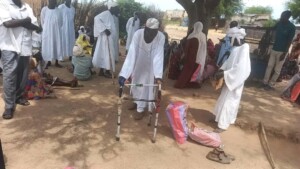More chikungunya cases in Port Sudan hospitals
The number of incidences of chikungunya fever has increased in Port Sudan. Health centres have witnessed a spike in the number of new patients.
 Waiting for a doctor at the Port Sudan Teaching Hospital (aispo.org)
Waiting for a doctor at the Port Sudan Teaching Hospital (aispo.org)
The number of incidences of chikungunya fever has increased in Port Sudan. Health centres have witnessed a spike in the number of new patients.
Journalist Osman Hashim told Radio Dabanga that some health centres and hospitals are experiencing unprecedented overcrowding because of the sudden rise in the number of patients.
He pointed to the outbreak of fever among households in the area of the Red Sea state capital, amid the rise of prices of intravenous pendulum solution from SDG220 to SDG300 ($6.30*).
He said that the state government failed to provide enough spray to eliminate mosquitoes that carry the disease. The Aedes aegypti mosquito, the same kind that spreads dengue and Zika virus, transmits the virus. It is characterised by an abrupt onset of fever, frequently accompanied by joint pain.
There is no specific antiviral drug treatment for chikungunya. Most patients recover fully within weeks, but in some cases joint pain may persist for several months, or even years. With older people, the disease can contribute to the cause of death.
Poor sanitation and contamination of drinking water are blamed for the spread of the mosquitoes.
A recent government report has shown more than 10,000 cases of chikungunya fever in Sudan’s Red Sea state over the past four months. In November, Radio Dabanga reported a rise of rates of chikungunya fever infections in eastern districts of Port Sudan in Red Sea state.
An outbreak of chikungunya began in August last year after heavy rains hit Sudan’s eastern Kassala state and El Gash river flooded large pieces of land. In October, health sources told Radio Dabanga that the number of patients admitted to health centres and private clinics in the eastern Sudanese state was increasing. Government officials reported at the time that at least 13,400 people in Kassala are infected with the mosquito-borne disease.
* As effective foreign exchange rates can vary widely in Sudan, Radio Dabanga bases all SDG currency conversions on the Market Makers Mechanism-determined daily US Dollar rate quoted by the Central Bank of Sudan (CBoS).











 and then
and then